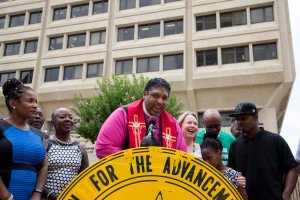The Washington Post reports, Federal judge blocks N. Dakota’s voter-ID law, calling it unfair to Native Americans:
 A federal judge on Monday called North Dakota’s strict voter-ID law unfair to Native Americans and blocked its use in the coming election, continuing a series of recent victories against restrictions imposed by state legislatures.
A federal judge on Monday called North Dakota’s strict voter-ID law unfair to Native Americans and blocked its use in the coming election, continuing a series of recent victories against restrictions imposed by state legislatures.
Here is the Order (.pdf).
In recent days, judges have blocked or loosened voting restrictions in Texas, North Carolina, Wisconsin and Kansas. The fights have pitted Democrats and civil rights groups who say restrictive ID laws discriminate against minorities against Republican legislators, who say they enacted the laws to combat voter fraud and protect the public’s confidence in elections.
U.S. District Judge Daniel L. Hovland said North Dakota for years had provided a safety net for those unable to provide the specific kinds of ID required, and that eliminating it in 2013 would mean eligible voters are disenfranchised.
Before 2013, the state allowed many forms of identification for use at the polls, and those without could sign affidavits to their identity. But the 2013 law allowed only four forms of ID: a North Dakota driver’s license; a North Dakota non-driver’s ID card; a tribal government-issued ID card; or an alternative form of ID prescribed by the secretary of state.
A provision added last year prohibited the secretary of state from allowing college IDs or military IDs to be used.



